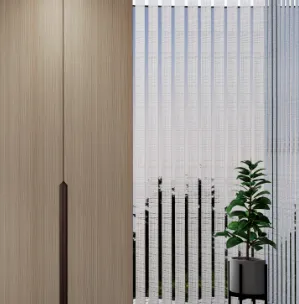- ບ້ານ
- On the Decorative Potential and Limitations of Wall Paper for Furniture
ພ.ພ. . 20, 2025 14:26 ກັບໄປທີ່ລາຍຊື່
On the Decorative Potential and Limitations of Wall Paper for Furniture
Wall Paper for Furniture, A decorative technique that applies traditional wallpaper to furniture surfaces has gradually gained attention from designers and consumers in recent years. It provides new possibilities for personalized customization of furniture, endowing old furniture with new vitality, while also reducing the cost of furniture renovation to a certain extent. However, the application of Wall Paper for Furniture is not unlimited. While pursuing aesthetics, its durability, practicality, and potential issues should also be fully considered.

The advantage of Wall Paper for Furniture lies in its powerful decorative properties
The ເຈ້ຍຕິດຕໍ່ອອກແບບສໍາລັບເຟີນີເຈີ has all the advantages of wallpaper: rich pattern selection, diverse material textures, and relatively convenient construction methods. Whether it's retro patterns, modern geometry, or abstract watercolors, they can all be cleverly integrated into furniture design through wallpaper, creating unique visual effects. For consumers who want to quickly change their furniture style or add new ideas to old furniture, Wall Paper for Furniture is undoubtedly an attractive choice. In addition, compared to traditional paints or films, wallpaper has relatively lower construction difficulty and can meet the needs of some DIY enthusiasts.
The limitations of the Wall Paper for Furniture cannot be ignored
The first and foremost issue is durability. During the use of furniture, the surface is inevitably subject to friction, collision, and even liquid erosion. Compared to surface treatment processes specifically designed for furniture, the wear resistance and stain resistance of ຫໍ່ເຈ້ຍເຟີນິເຈີ are relatively weak. Especially on the surfaces of furniture that are frequently used, such as tabletops, drawers, etc., wallpaper is more prone to scratches, stains, and even peeling, which affects the overall aesthetics and service life.
The scope of application of Wall Paper for Furniture is also limited to some extent
For furniture with complex structures and numerous corners, the difficulty of pasting wallpaper will greatly increase, which can easily lead to problems such as bubbles and wrinkles, affecting the final decorative effect. In addition, some furniture surfaces made of special materials, such as untreated wood or metal surfaces, may not effectively bond with wallpaper, leading to wallpaper detachment.
The potential issues with the Wall Paper for Furniture should also be taken seriously
Some low-quality wallpapers may contain harmful substances such as formaldehyde, which can have an impact on human health if exposed to them for a long time. Therefore, when choosing a ເຈ້ຍຕິດຕໍ່ສໍາລັບເຟີນີເຈີໄມ້, it is advisable to choose environmentally certified products and ensure good ventilation during the construction process.
In summary, ເຈ້ຍຕິດຕໍ່ສີຂາວສໍາລັບເຟີນີເຈີ, as an emerging decorative technique, has certain decorative potential and practical value. It can quickly change the style of furniture and provide more choices for personalized customization. However, while pursuing aesthetics, we should also fully consider its durability, applicability, and potential issues. Only by choosing high-quality wallpapers and adopting the correct construction methods can we maximize the advantages of Wall Paper for Furniture and avoid its potential negative impacts. In the future, with the continuous development of materials science, more durable and environmentally friendly furniture wallpapers may emerge, further expanding their application scope and enhancing their decorative effects.
Wallpaper for Furniture FAQs
What is Wall Paper for Furniture?
Wall Paper for Furniture is a special type of paper designed specifically for furniture surface decoration. It is usually made from high-quality base paper and processed through printing, embossing, dipping, and other processes. This type of Wall Paper for Furniture can perfectly simulate various wood grain, stone grain, solid color or pattern effects, and is widely used for surface veneers in panel furniture, cabinets, interior decoration and other fields.
What are the main types of Wall Paper for Furniture?
It is mainly divided into three categories:
Melamine Wall Paper for Furniture: Impregnated with melamine resin, it has wear-resistant and heat-resistant properties
PVCWall Paper for Furniture: The surface is covered with PVC film, which has excellent waterproof performance
Wall Paper for Furniture: Environmentally friendly plastic free veneer suitable for children's furniture
Fireproof board Wall Paper for Furniture: with flame retardant properties, used for furniture in public places
What are the advantages of Wall Paper for Furniture compared to solid wood veneer?
The Wall Paper for Furniture has the following significant advantages:
High cost-effectiveness, priced at only 1315 yuan for solid wood veneer
Rich pattern selection, customizable with various colors and textures
Easy to construct, can be directly applied to various substrate surfaces
Easy to maintain, most products have wear-resistant and easy to clean characteristics
Good environmental friendliness, some products meet E0 level environmental standards
How to choose the Wall Paper for Furniture correctly?
When making a choice, the following factors should be considered:
Usage scenario: Kitchen furniture should be waterproof, and children's rooms should be environmentally friendly
Substrate type: Different boards have different thickness requirements for Wall Paper for Furniture
Wear resistance grade: Select AC1AC5 different grades according to the frequency of use
Environmental standards: prioritize E0 or ENF grade products
Visual effect: Consider overall decoration style matching
What is the current market development trend of Wall Paper for Furniture?
The main trends are as follows:
Environmental upgrade: water-based ink and formaldehyde free adhesive applications are becoming increasingly popular
Technological innovation: Digital printing enables small batch personalized customization
Function expansion: The rise of intelligent veneers such as antibacterial and self-cleaning
Design innovation: New technologies such as 3D stereoscopic effect and metallic texture emerge
Market segmentation: An increase in specialized Wall Papers for Furniture targeting different types of furniture
ຂ່າວລ່າສຸດ
-
White Contact Paper for Cabinets – Transform Your Kitchen
ຂ່າວJun.13,2025
-
Duplex Board Paper: Properties and Manufacturing Process
ຂ່າວJun.13,2025
-
Food Packaging Solutions: Why Duplex Board is a Top Choice
ຂ່າວJun.13,2025
-
Best Types of Furniture Decoration Paper
ຂ່າວJun.13,2025
-
What Are the Best Adhesives for Applying Furniture Decoration Paper?
ຂ່າວJun.09,2025
-
Key Properties and Uses of Duplex Board Paper in Packaging
ຂ່າວJun.09,2025

